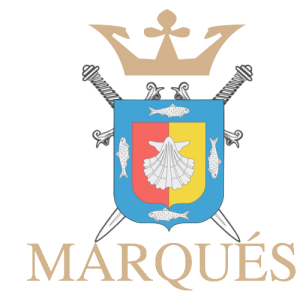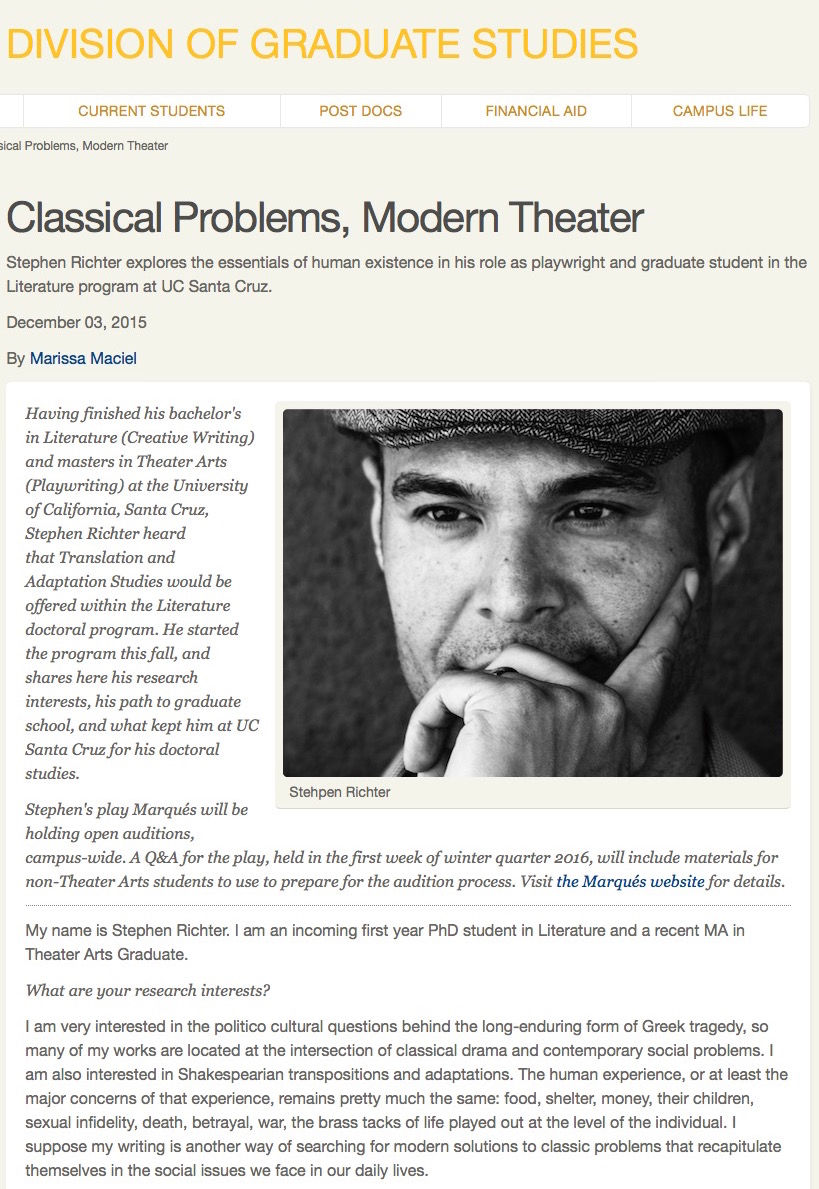Classical Problems, Modern Theater
Stephen Richter explores the essentials of human existence in his role as playwright and graduate student in the Literature program at UC Santa Cruz.
December 03, 2015
By Marissa Maciel
Having finished his bachelor’s in Literature (Creative Writing) and masters in Theater Arts (Playwriting) at the University of California, Santa Cruz, Stephen Richter heard that Translation and Adaptation Studies would be offered within the Literature doctoral program. He started the program this fall, and shares here his research interests, his path to graduate school, and what kept him at UC Santa Cruz for his doctoral studies.
Stephen’s play Marqués will be holding open auditions, campus wide. A Q&A for the play, held in the first week of winter quarter 2016, will include materials for nonTheater Arts students to use to prepare for the audition process. Visit the Marqués website for details.
My name is Stephen Richter. I am an incoming first year PhD student in Literature and a recent MA in Theater Arts Graduate.
What are your research interests?
I am very interested in the politico cultural questions behind the long-enduring form of Greek tragedy, so many of my works are located at the intersection of classical drama and contemporary social problems. I am also interested in Shakespearian transpositions and adaptations. The human experience, or at least the major concerns of that experience, remains pretty much the same: food, shelter, money, their children, sexual infidelity, death, betrayal, war, the brass tacks of life played out at the level of the individual. I suppose my writing is another way of searching for modern solutions to classic problems that recapitulate themselves in the social issues we face in our daily lives.
Before you came to the graduate program, what other experiences did you have with higher education? When did you know you wanted (or needed) to go to graduate school?
I attended UCSC as an undergraduate in Literature, in the creative writing concentration, earning highest honors in the major and summa cum laude at the university level. I received my masters in theater arts from UCSC with an emphasis in playwriting. Once the Literature department announced that they were beginning Translation and Adaptation Studies within the Literature PhD, I knew I wanted to contribute to that conversation in both contexts and decided to apply.
How did you decide to focus on Literature as a research interest?
Literature has played huge role in my life. As a U.S. Marine living in Japan, then later as an expatriate for nearly a decade in México and Latin America, I spent a great deal of time writing and reading national literatures as well as translations of English literature. I was fascinated by the way certain narratives move through culture and across cultures and the power they have to shape lives and identities. Returning to the United States, and to the Literature Department at UCSC, I was exposed to other forms of translation: that of signs and temporalities. All of my work deals with breaking down stereotypical misconceptions of cultures outside the United States, especially Mexican culture, through bilingual texts and hybrid adaptations.
I wanted to pursue my translation and adaptation work further in both scholarly and creative ways. Universities such as UCSC are pioneering these sorts of hybrid textual explorations, where theory and practice meet. I was burning to be a part of the movement.
Why did you decide to come to UCSC for your graduate education?
The academic expertise of the faculty and the opportunities for cross- disciplinary collaboration that UCSC was built upon is unique. As an undergrad, I was fortunate to have had the opportunity to study classical myth with professor Mary-Kay Gamel and playwriting with professor James Bierman, both iconic theater practitioners and scholars in their fields. Under their guidance, I began to adapt various versions of the Media muthoi into Maria – a telenovela for the stage, which won the Humanities Dean’s Award and Chuck Lorre’s Dharma Grace Award in playwriting. The Dharma Grace Award funded the production of the play. The production of Maria became the content as well as the performative aspect of my masters’ thesis in Theater Arts.
The Literature department at UCSC continued to nurture my interests in both translation and adaptation during the entire process. The guidance I received from Professor Susan Gillman from the Literature Department was instrumental in the writing of Maria – an adaptation of Euripides’ Medea – Dose – an adaptation of Sophocles’ Oedipus at Colonus – and now Marqués, an adaptation of Shakespeare’s Macbeth, set in the world of the Mexican drug cartels, which is the current project/production I will be working on my first year in the Literature PhD. which will open at UCSC’s Experimental Theater Friday, February 26th, 2016. So, for me, the decision to come to UCSC for my graduate education was based on the result of the work and research that began as an undergraduate, continued and expanded while working on my capstone thesis for my master’s degree, and that has now evolved into the main inquiry of my dissertation work in the PhD.
What do you enjoy or appreciate about being a graduate student?
I feel extremely blessed to have found a space to pursue my research interests in both the creative and critical contexts. Plus, to have an opportunity to explore just what it means to reread or rewrite the past, through translation and adaptation, is an extremely exciting endeavor, especially when you get to put the work on the stage. Performance and the immediacy of theater never ceases to amaze me. The audience plays such a vital role in creating meaning in a performative text, that as a writer, one can only sit back, let go, and see what the play has to say for itself. Each time it will be something different, but never exactly what was “intended.”
So, I would say the opportunities I have been given in both creative production and research are what I like the most about being a graduate student at UCSC.
What do you believe could improve the graduate student “experience” at UCSC?
Graduate life here at UCSC has been Shangri-La and Camelot all rolled into one for me. It has been an amazing experience largely due to the opportunities for interdisciplinary collaboration. If I would like to see more of anything in the graduate experience, it would be more events and activities that foster further collaborations.
Do you have any specific aspirations for postgraduate school life?
To continue to write for the page and the stage, everyday and to teach others what I have learned along the way.


